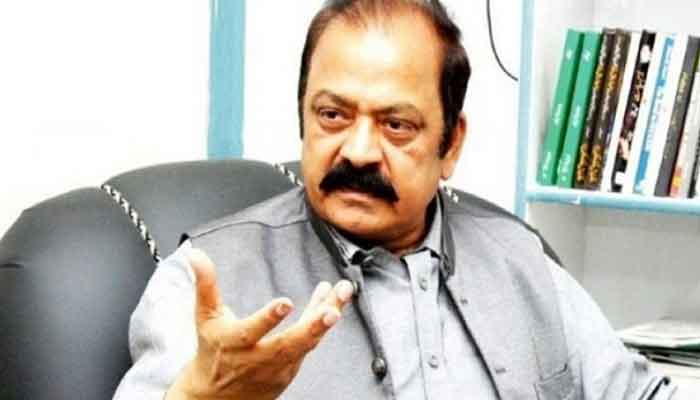LHC rules seriousness of allegation not ground for bail refusal in doubtful cases
The offence with which Rana Sanaullah has been charged falls in the prohibitory clause of the CNSA, hence case of bail was not made out, he pleaded.
ISLAMABAD: Lahore High Court (LHC) judge Justice Chaudhry Mushtaq Ahmad, while granting bail to the Pakistan Muslim League-Nawaz (PML-N) leader Rana Sanaullah, held that seriousness of allegation was not a ground for refusal of bail if on merits it is found that the prosecution’s case is doubtful.
n this connection, the judge ruled, “law is well settled”. “Benefit of doubt always goes to the accused even at the bail stage. Incarceration of accused before conviction in cases of doubtful nature is never approved by courts.”
The Anti-Narcotics Force (ANF) prosecutor argued that Section 51 of the Control of Narcotics Substances Act (CNSA) creates a bar on courts to grant of bail in cases of extreme [death] penalty. The offence with which Rana Sanaullah has been charged falls in the prohibitory clause of the CNSA, hence case of bail was not made out, he pleaded.
Section 51 says notwithstanding anything contained in sections 496 and 497 of the Criminal Procedure Code (CrPC), bail shall not be granted to an accused person charged with an office under this legislation or under any other law relating to narcotics where the offence is punishable with death.
So, the condition is that if the crime entails capital punishment, no bail will be given by any judicial forum. A certain quantity of narcotics recovered from an accused makes it mandatory for the courts to award death penalty to him/her.
However, record is witness that all the high courts have granted bails to accused persons in the otherwise non-bailable offences instituted by the National Accountability Bureau (NAB) and other agencies, finding no credible evidence to prove the guilt, disagreeing with the prosecution.
The National Accountability Ordinance (NAO) and the CNSA equally oust the jurisdiction of all courts including even the Supreme Court and high courts to grant bail to the accused charged under these laws.
Section 9 of the NAO says all offences under this law shall be non-bailable and, notwithstanding anything contained in sections 426, 491,] 497, 498 and 561 A or any other provision of the CrPC, or any other law for the time being in force, no court shall have jurisdiction to grant bail to any person accused of any offence under it.
The high courts use their legal and constitutional powers to hear and accept bail pleas of the accused persons, arraigned under the CNSA and NAO despite the prohibition contained in these laws. In the NAB cases, the aggrieved parties invoke Article 199 of the Constitution (jurisdiction of high courts when no other adequate remedy is provided by law) to get bails.
Before Sanaullah approached the LHC and got bail, the special anti-narcotics court of Lahore was about to pronounce his decision on a similar plea after the hearing the arguments of the defence and prosecution. However, the judge announced in the court that he can’t announce his ruling as he has just received his transfer order through WhatsApp. The new judge rejected Sanaullah’s bail plea but accepted such requests of all of his five co-accused.
Despite the clear restriction on bail contained in the NAO, the LHC and Islamabad High Court (IHC) have granted bails to Nawaz Sharif on medical grounds and permission to go abroad for treatment, Maryam Nawaz in the Chaudhry Sugar Mills case, Shahbaz Sharif in the Ashiana Housing Scheme case, Miftah Ismail and Imranul Haq in the LNG case, Eng. Qamarul Islam and a dozen others in the Saaf Pani Company, and Asif Ali Zardari and Faryal Talpur in the money laundering through fake bank accounts case.
-
 Travis Kelce Plays Key Role In Taylor Swift's 'Opalite' Remix
Travis Kelce Plays Key Role In Taylor Swift's 'Opalite' Remix -
 How Jennifer Aniston's 57th Birthday Went With Boyfriend Jim Curtis
How Jennifer Aniston's 57th Birthday Went With Boyfriend Jim Curtis -
 JoJo Siwa Shares Inspiring Words With Young Changemakers
JoJo Siwa Shares Inspiring Words With Young Changemakers -
 James Van Der Beek Loved Ones Breaks Silence After Fundraiser Hits $2.2M
James Van Der Beek Loved Ones Breaks Silence After Fundraiser Hits $2.2M -
 Disney’s $336m 'Snow White' Remake Ends With $170m Box Office Loss: Report
Disney’s $336m 'Snow White' Remake Ends With $170m Box Office Loss: Report -
 Travis Kelce's Mom Donna Kelce Breaks Silence On His Retirement Plans
Travis Kelce's Mom Donna Kelce Breaks Silence On His Retirement Plans -
 Premiere Date Of 'Spider-Noir' Featuring Nicolas Cage Announced
Premiere Date Of 'Spider-Noir' Featuring Nicolas Cage Announced -
 Pedro Pascal's Sister Reveals His Reaction To Her 'The Beauty' Role
Pedro Pascal's Sister Reveals His Reaction To Her 'The Beauty' Role -
 Kate Middleton Proves She's True 'children's Princess' With THIS Move
Kate Middleton Proves She's True 'children's Princess' With THIS Move -
 Paul Anka Reveals How He Raised Son Ethan Differently From His Daughters
Paul Anka Reveals How He Raised Son Ethan Differently From His Daughters -
 'A Very Special Visitor' Meets Queen Camilla At Clarence House
'A Very Special Visitor' Meets Queen Camilla At Clarence House -
 Jodie Turner Smith Shares One Strict Rule She Follows As A Mom
Jodie Turner Smith Shares One Strict Rule She Follows As A Mom -
 Hailey Bieber Reveals KEY To Balancing Motherhood With Career
Hailey Bieber Reveals KEY To Balancing Motherhood With Career -
 Photo Of Jay-Z, Other Prominent Figures With Jeffrey Epstein Proven To Be Fake
Photo Of Jay-Z, Other Prominent Figures With Jeffrey Epstein Proven To Be Fake -
 Hillary Clinton's Munich Train Video Sparks Conspiracy Theories
Hillary Clinton's Munich Train Video Sparks Conspiracy Theories -
 Fans Slam Talk Show Host For 'cringe' Behavior In Chris Hemsworth Interview
Fans Slam Talk Show Host For 'cringe' Behavior In Chris Hemsworth Interview




